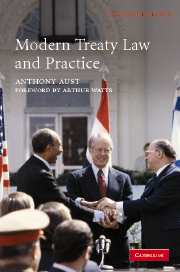Book contents
- Frontmatter
- Contents
- Foreword to the first edition by Sir Arthur Watts
- Preface to the second edition
- Articles of the Convention cited in the text
- Table of treaties
- Table of MOUs
- Table of cases
- Glossary of legal terms
- List of abbreviations
- Introduction
- 1 Vienna Convention on the Law of Treaties 1969
- 2 What is a treaty?
- 3 MOUs
- 4 Capacity to conclude treaties
- 5 Full powers
- 6 Adoption and authentication
- 7 Consent to be bound
- 8 Reservations
- 9 Entry into force
- 10 Treaties and domestic law
- 11 Territorial application
- 12 Successive treaties
- 13 Interpretation
- 14 Third states
- 15 Amendment
- 16 Duration and termination
- 17 Invalidity
- 18 The depositary
- 19 Registration and publication
- 20 Dispute settlement and remedies
- 21 Succession to treaties
- 22 International Organisations
- 23 Drafting and final clauses
- Appendices
- Index
22 - International Organisations
- Frontmatter
- Contents
- Foreword to the first edition by Sir Arthur Watts
- Preface to the second edition
- Articles of the Convention cited in the text
- Table of treaties
- Table of MOUs
- Table of cases
- Glossary of legal terms
- List of abbreviations
- Introduction
- 1 Vienna Convention on the Law of Treaties 1969
- 2 What is a treaty?
- 3 MOUs
- 4 Capacity to conclude treaties
- 5 Full powers
- 6 Adoption and authentication
- 7 Consent to be bound
- 8 Reservations
- 9 Entry into force
- 10 Treaties and domestic law
- 11 Territorial application
- 12 Successive treaties
- 13 Interpretation
- 14 Third states
- 15 Amendment
- 16 Duration and termination
- 17 Invalidity
- 18 The depositary
- 19 Registration and publication
- 20 Dispute settlement and remedies
- 21 Succession to treaties
- 22 International Organisations
- 23 Drafting and final clauses
- Appendices
- Index
Summary
I don't want to belong to any club that would have me as a member.
Given their importance for treaties, international organisations deserve a separate chapter. There is no agreed definition of ‘international organisation’, but for present purposes it is an international legal entity created by a multilateral treaty, with international legal personality, and principally with states as members. Such organisations are sometimes referred to as ‘intergovernmental’ (see Article 2(1)(i)), though ‘interstatal’ might be more accurate. (Some special cases are mentioned at page 411 below.)
International organisations grew out of the diplomatic conferences of the nineteenth century, as states sought more effective ways to deal with problems caused by the rapid development of international society. Thus, the International Telegraphic (later Telecommunications) Union (ITU) and the Universal Postal Union (UPU) were founded in the 1860s. There are now countless international organisations, ranging from large ones with global responsibilities and virtually universal membership, such as the United Nations and UN specialised agencies, to regional or international, but more narrowly focused, organisations, such as the (large) European Union and the (tiny) International Whaling Commission. Although they share certain characteristics, each international organisation is different and must be studied separately.
The importance of international organisations for treaties is fourfold. First, they are creations of treaties. Secondly, international legal personality is an essential element. Thirdly, being subjects of international law, they can and do conclude many treaties with other such subjects, both states and international organisations.
- Type
- Chapter
- Information
- Modern Treaty Law and Practice , pp. 392 - 419Publisher: Cambridge University PressPrint publication year: 2007



